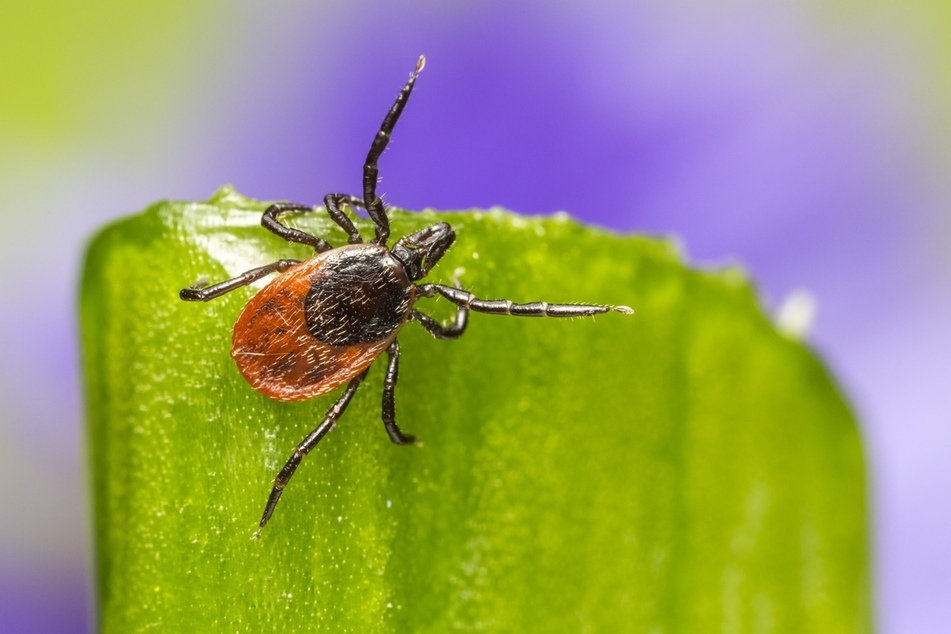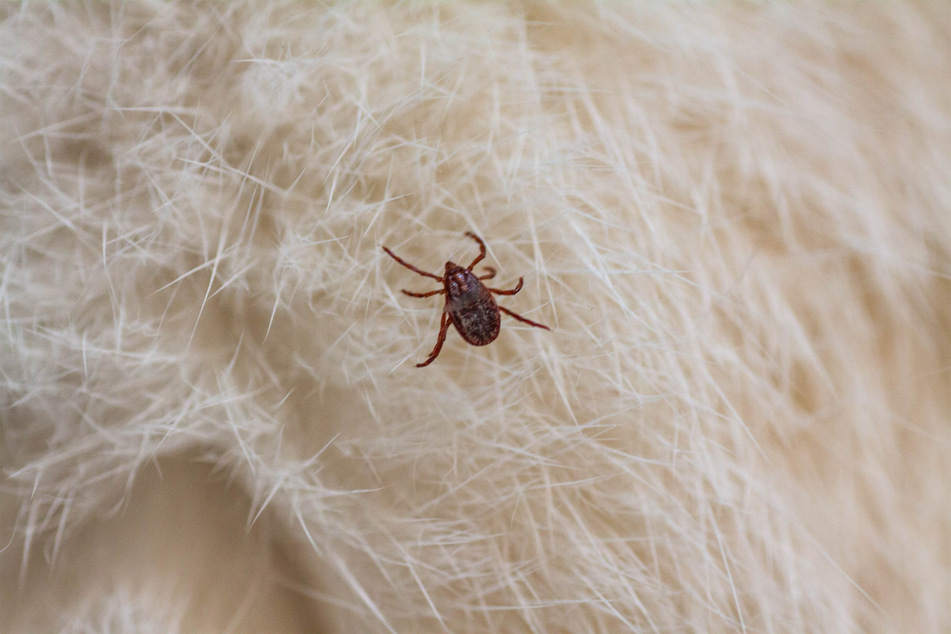Ticks on cats: Symptoms, prevention, and how to get rid of them
If you live in an area prone to ticks, you should be regularly checking your cat for them. What happens if they get one though, though? What are the symptoms of ticks in cats, and what can you do to help?

From spring to fall, outdoor cats – and pets in general – are at risk of being attacked by ticks.
These tiny parasites dive in under our feline friends' fur, infecting them and posing a huge risk to their health and life.
What can be done, and should we be worried?
In this cat guide, TAG24 will take a look at ticks in cats. How do you prevent and check for tick infestation, what are the symptoms, and how do you get rid of them?
Read on below for all you need to know.
Important: We love cats here at TAG24, but we're not vets. This is a straight forward and simplified guide to ticks, but is by no means an authoritative source. If you are concerned, make sure to go immediately to your veterinarian.
What are ticks?
Believe it or not, ticks are actually arachnids, making them quite similar to spiders in their genetic and anatomical design. A type of parasitic mite, these tiny little animals generally live on plants, but feed off the blood of various animals, including mammals, birds, and even reptiles. Known for carrying serious diseases, these tiny little bugs are considered seriously dangerous.
Fascinatingly, ticks originated around 100 million years ago during the Cretaceous period, and are some of the longest surviving animals in the world. There are many different kinds of ticks, each one coming from a different area and housing various characteristics. One thing they all have in common, though, is that they are parasitic.
Each tick generally survives by clinging onto a "host." From here they burrow their head under the skin and consume the animal's blood. The problem is that ticks themselves play host to a variety of different diseases, meaning that a bite can cause the transfer of said disease. On top of that, a tick's bite mark can get infected, causing additional health complications.
Ticks are so dangerous that they cause life-threatening illnesses every single year. They are famous for the spread of Lyme disease in the United States, and need to be dealt with very carefully with humans and pets, no matter what kind of tick has attacked or where you are in the world.
Can cats get ticks?
Yes, like any mammal, a cat can be bitten by a tick and that tick can infect it with all sorts of nasty and dangerous diseases. Ticks are actually even more dangerous to cats than people, as their immune systems are not quite as strong as ours, and the world of animal medicine is less advanced than the human equivalent.
Ticks on cats symptoms
Ticks are particularly nasty when they get onto a cat and will quickly cause a deterioration in your cat's health and happiness if left unchecked or unnoticed. As a result, it's good to have a decent understanding of the basic symptoms associated with tick infection.
Keep in mind, of course, that these symptoms aren't related to any specific diseases, but are instead just simple signs that your cat may have a tick.
Here are the basic symptoms of ticks on cats:
- A small bump in the fur where there usually wouldn't be
- Black dot-like lump (the tick's behind) popping out of your cat's skin
- Hair loss around above-mentioned bump / lump
- Stiffness and difficulty moving
- Lethargy
- Unusually low appetite
- Swelling in various areas of the body
- Fever
- Weight loss
Ticks will generally bite on a cat's head or neck, but can also latch onto their back, tail, or undercarriage. It is entirely based on where the tick got onto your cat, in other words, what part of your cat's body brushed past the tick unaware.
Keep in mind: There are many symptoms that can indicate illness of some form or another in your cat. If you suspect a tick, look for it even if the symptoms aren't present on the above list. In the case that you are seriously concerned, take your feline friend to the vet immediately.

What do ticks look like on cats?
If you've ever had a tick, you'd know what they look like - and it'll be the same on a cat.
These tiny little eight-legged arachnids are generally a darker color (usually black, though not always) and are usually noticed either crawling along or as a dark lump on someone's skin. This lump will likely be surrounded by a small amount of swelling.
The difficulty about cats' bites, though, is that felines are covered in fur. As a result, it can be very difficult to find ticks on a cat, as the insects are tiny and will burrow their way through the fur before they bite into the skin. Use context clues such as soreness and inflammation to find these tiny demons.
To summarize: A tick that has bitten your cat will be found underneath the fur, stuck into its skin. It will resemble a black lump that will likely be surrounded by a small amount of inflammation. Cats don't get freckles or moles, so if you find a bump, it is more than likely a tick.
Diseases from ticks on cats

There are many, many diseases that cats can catch from ticks, as they carry a vast number of viruses and bacteria. As a result, it would be very difficult to list and go into detail on every single known tick-borne sickness.
Instead, let's take a look at four of the most common diseases that cats can get from tick bites. These are some of the more serious conditions, and should all be taken seriously. In short - these diseases are why you should always take your cat to the vet after a tick bite.
Your cat can catch these diseases from tick bites:
- Lyme disease: The bacteria that triggers Lyme disease is contained in a whopping 30-40 % of all ticks. An incredibly dangerous and often fatal condition, Lyme disease can cause inflammation, lameness, a loss of appetite, fevers, various aches and pains, and paralysis in your cat.
- Anaplasmosis: Anaplasmosis is caused by bacteria that attack white blood cells in your cat's body and cause symptoms that include apathy, weight loss, fever, and anemia. While rare, the condition caused by anaplasmosis can be severe if left unchecked or untreated.
- Babesiosis: An infectious disease that causes the infection of red blood cells, babesiosis is caused by a parasite called babesia. It manifests itself in symptoms such as high fever, weakness, loss of appetite, and red-to-brownish urine.
- Tularemia: Found all over the United States, tularemia is a serious condition caused by the bacterium Francisella Tularensis. The most common symptom is a very high fever, swollen and painful lymph nodes, and jaundice.
This is by no means a complete list of tick-borne diseases in cats. There are many, many more, magnifying the importance of a proper vet check-up after any tick bite.
Can ticks kill cats?
Yes, ticks can and regularly do kill cats. There is no one particular illness that is of most concern, though the four we just discussed are certainly up there in terms of risk levels.
What's important to note is that tick attacks are often undetected, so it's unknown how many cats get bitten each and every year. It's hard to find ticks on a cat because once they have finished feeding they will fall off and crawl away to find a new victim.
How to get rid of ticks on cats

Removing and getting rid of ticks is one of the most important things that you should learn how to do if you own a cat. This goes double if you live in an area prone to ticks, or if your cat is an outside kitty that likes to go on adventures.
Of course, you should still see the veterinarian even if you remove the tick successfully. This way your cat can be checked for infection and fast action can be taken if trouble abounds, or part of the tick is stuck inside your cat's skin.
To remove ticks from cats, proceed as follows:
Step 1: Buy a pair of professional and specifically designed tick pliers from your local pet store or vet. This is important as they are very accurate and designed to not break the tick when removing it.
Step 2: Gently pull your cat's fur apart to expose the tick, and place the tick pliers as close to the skin as you can before making contact.
Step 3: Grab the head of the tick (without crushing its body) and pull it out, as straight as you can. Keep in mind that different tick pliers will require different techniques (for example, it may need to be twisted out). Read the instructions to check. Make sure that you're not jerking or imprecise with your movement.
Step 4: Dispose of the tick properly by first placing it in some folded kitchen paper and crushing it with a solid object (not your finger or any body part - it can bite you too, remember). Feel free to use alcohol or disinfectant instead. Place the carcass in a plastic zip-lock back and take it with you to the vet.
Step 5: Check that you have removed the tick completely, disinfect the puncture wound on your cat's skin, and give it all a good wash.
Having removed the tick and washed the wound, it's important to keep an eye on your cat for any behavioral changes that could indicate illness or disease. Your kitty could develop signs of sickness even after your veterinarian trip, so be extra vigilant.
Important: Make sure that you are very careful when getting rid of ticks on cats. The worst thing that can happen is that the head of the tick can break off and part of its body can stay inside your kitty when you try to remove it. This can cause seriously bad infections and makes it very hard to get the rest out.
How to prevent ticks on cats
There is no vaccination against ticks in cats, but there is a liquid deterrent that works extremely well to deter tick attacks. This spot-on liquid is designed to be applied monthly to the back of your cat's neck (so that it can't lick the stuff off) and will stop various parasites, including fleas and ticks, from attacking.
It is compulsory in many countries and various US states, and your vet will likely suggest or recommend the tick treatment. This stuff is extremely effective and works well to protect your cat against ticks for an entire month. To make things better, it is not too expensive either!
Apart from that, the only real way to stop your cat from getting ticks is to keep it inside. Once outside, there's no controlling where your cat goes or what it rubs up against. It is best to let it outside, but make sure that it is always treated with tick medicine each and every month.

Can ticks on cats transfer to humans?
Ticks that have not yet burrowed into your cat's skin and are, perhaps, crawling through its fur, can easily transfer to humans. It is unlikely, however, that a tick which has been removed from your cat after biting it will still be alive and capable of biting you in return. You should still wear gloves when dealing with a tick, though, just to be safe.
Many of the diseases borne by ticks can infect humans as well as cats. While we have better medicine to fight them off and generally stronger immune systems, these diseases can still cause serious and permanent harm. For example, the CDC estimates that approximately 476,000 people may be infected with Lyme disease each and every year in the US alone.
Finding and removing ticks on cats is extremely important
Ticks are disturbing, nasty creatures that can debilitate and even kill those that they cling on to. These parasites pose an enormous risk to your cats, dogs, and even yourselves, and should be taken very seriously.
If you ever find that you, a friend or family member, your cat, or any other animal that you're close with has been attacked by a tick, you should try to get rid of it immediately. Seek medical advice, either from a doctor or veterinarian, and get everything checked - it's better to be safe than sorry.
Cover photo: Collage: IMAGO/Zoonar & 123RF/Anastasiyaparfenyuk



